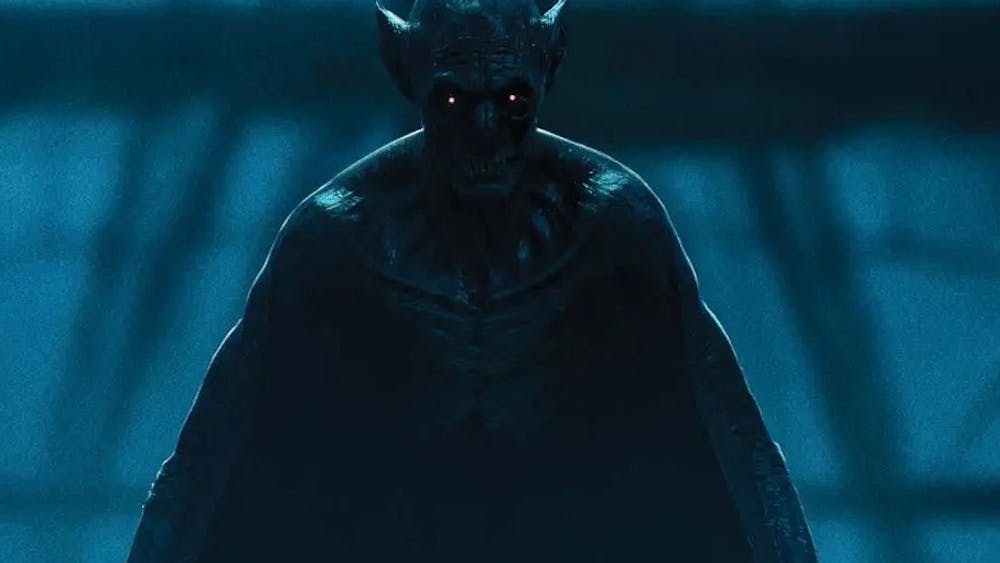For New York Press columnist Jim Knipfel, the light has been slowly fading.\nHis strained retinas worsen with every passing day. Though he still holds down a job as the alternative weekly's receptionist and can periodically read a book or magazine article, Knipfel is already legally blind at the age of 36. He gets about with a red-tipped cane and wears a fedora with a wide brim to warn him if he's about to run into something. Blindness, total and all-encompassing, is only an inevitability at this point.\nYet when he is finally immersed in total darkness, he'll likely find himself comfortable.\nAll things considered, it wouldn't mark that much of a change. Knipfel, whose memoir "Quitting the Nairobi Trio" was recently published, has spent the better part of his life dwelling in the shadows.\nKnipfel is an embittered man, but he has every reason for it. Beyond the degenerative eye disorder, he suffers from an inoperable brain lesion, which gives him frequent "rage seizures" and heightens his anti-social impulses. Long plagued by the demons of the bottle, he has been through a failed marriage and several suicide attempts.\nAnd Knipfel has devoted his life to telling his story. His weekly column, which has earned him a loyal cult following, takes a darkly comic look at his daily tribulations. Like a sort of modern-day Nietzsche, Knipfel is maniacally self-obsessed. Yet the one-time philosophy student is far more earnest than his German predecessor, bearing his soul in weekly installments.\nAnd, as a reviewer for the Chicago Sun-Times aptly put it, "for a guy who's tried to kill himself several times, Knipfel sure is funny."\nA follow-up to "Slackjaw," which detailed his life story, "Nairobi Trio" recalls the time he spent in a psych ward in Minneapolis after he tried to off himself with scotch and sleeping pills. After the opening chapter, he wakes up to find himself tied down to a hospital bed, screaming out rhymes in German. His parents cautiously watch over him, and he's informed that he'll spend "the next few weeks" under psychiatric observation.\nAnd so he's taken down to the "Bin," as he affectionately puts it. When the nurse tells him it's six floors underground, he sardonically reminds himself the sixth level of hell is where the heretics dwell in Dante's "Inferno."\nThe literary allusion proves prophetic. His experience in the ward turns out to be a jumble of Kafkaesque absurdity and existential despair. "One Flew over the Cuckoo's Nest" pales in comparison. In his first night, his roommate Joey slashes his wrists with a broken shard of glass from the mirror. The orderlies mopping up the blood from the bathroom floor insist that he mind his own business, and he awakens the next morning to find no trace of Joey.\n"When I woke up the next morning I take a look around. Any evidence of Joey's ever having been in that room had been erased. His bed was made, all his drawers had been cleaned out. There was nothing left. Just as well ' I didn't much care for the idea of having a roommate anyway.\n"I put some clothes on and headed out to the front desk. None of the other patients were up.\n"'This might be kind of awkward timing,' I said to the nurse behind the counter, 'but I need a shave ' do you suppose I could get my razor?'"\nIt is with this ironic detachment that Knipfel weathers the daily indignities and frustrations to which he's subjected in the ward. His fellow inmates are only randomly communicative at best, and his doctor won't deign to see him for more than 10 minutes a week. His parents seldom visit, and he is only allowed to venture into the sunshine once.\nWhile his doctor admits he steadily made progress from day one after his "psychotic break," he treats Knipfel only with cold suspicion, long refusing to approve a transfer.\nWhen Knipfel started out as a columnist for the now-defunct Philadelphia Welcomat, he was an angry young man who ranted against society with utter contempt. He urged his readers to burn down a recently opened Borders and came out in favor of Iraq during the Gulf War because "Saddam (Hussein) is the rare world leader with two balls to scratch."\nHe has mellowed out since his early days, in part because the steadily encroaching blindness prevents him from drinking. "Quitting the Nairobi Trio" is the work of a mature writer, comfortable with his craft.\nKnipfel has always had a natural knack for story-telling, expanding personal anecdotes into full-fledged columns. His books also have that fluent narrative flow, but he pains himself more on polishing his prose than slinging arrows.\nNonetheless, the thematic content is largely the same. "Quitting the Nairobi Trio" ends on a note of grudging self acceptance. After being released from the ward, Knipfel realizes that letting all the petty frustrations of day-to-day life eat into him serves no purpose. His revelation is one of the necessity of stoicism, calmly withstanding the breaking waves.\nKnipfel's been through a lot, and his message carries all the more weight.
Writer relates psych ward experience
Get stories like this in your inbox
Subscribe





